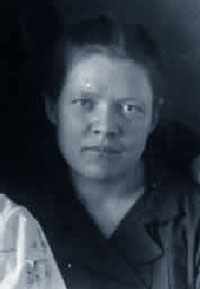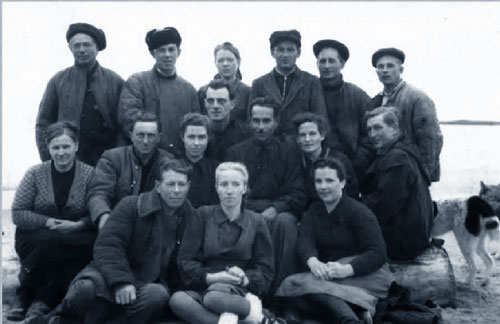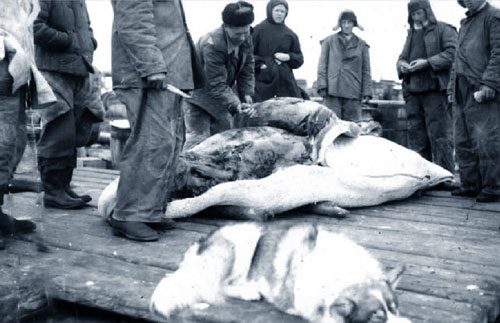









 Born
in Marxstadt, Saratow Region, ASSR of the Volga-Germans on the 6th August 1923.
Deported to the Tayevsk District, Krasnoyarsk Territory in 1941. As from 1942
she lived in the small settlement of Dorofeyevsk, Ust-Yeniseysk District, Taimyr
Autonomous Area, as a special settler.
Born
in Marxstadt, Saratow Region, ASSR of the Volga-Germans on the 6th August 1923.
Deported to the Tayevsk District, Krasnoyarsk Territory in 1941. As from 1942
she lived in the small settlement of Dorofeyevsk, Ust-Yeniseysk District, Taimyr
Autonomous Area, as a special settler.
My parents were kolkhoz workers. My father died one month before the outbreak of war in May 1941.
We were forced to leave Marxstadt on the 16 of September 1941 and left for Siberia. There was a dough trough in my aunt’s house; she intended to bake some bread to go, but the did not permit her to do that.
We first went to Saratov by barge, afterwards we were going by train for a whole month. After having made numerous detours, we finally arrived in Kazakhstan. On October 16 we were delivered to the village of Veselaya in the Tayevsk District.
In Siberia I worked for a kolkhoz farm as an unskilled labourer: I had to milk cows, help with the hay harvest.
On the 6th of June 1942 they ordered me to appear in front of the military commission. Since I was a member of the Komsomol, I thought they would like to make use of me in some way – maybe as a nurse, who could dress wounds. At school I had taken part in medical training courses; they had taught us how to render other people first aid. It utrned out, however, that they intended to deport me once again ... to the far north, where labour force was badly needed. They did not even give me the permission to say good-bye to my relatives. They were terribly afraid that we might hide in some place and then run away. But where were we supposed to hide away? We were even unable to understand and speak Russian.
They explained to us that we would be away for about three months and that they would take us home afterwards. Since this time I have not seen my mother again. She stayed in Siberia.
We went on board a lighter which was part of a train of barges towed by a towboat named „Molotov“. They delivered us to the settlement of Dorofeevsk situated about fourhundred kilometers north of the settlement of Ust-Port. They told us to debark and then abandonded us right on the riverbanks. The whole place was snow-covered. We took shelter for the night under boats which we had turned upside down. There were only a few houses in the settlement, which were occupied by Russians; maybe they had been deported to this place, as well – former dispossessed. They were also working for the fishing industry, just like us. When he had still been living in the river Volga, I often went fishing with my father, however, we had used small nets then. Here, in the far north, they used to catch fish by means of a big dragnet. Normal nets are very light, while the dragnet was terribly heavy – it was about 350 to 400 meters in length. And we had to cast it into the Yenisey several times. It was a really hard labour. We did our job, all drenched with rain, without wearing shoes. I was sent to Karpovsk, where all the caught fish was delivered to the point of acceptance; the fishermen who were working in this place were exclusively Nents. I was all alone among them. But they neither discriminated us, the exiles, nor did they ever utter any word of insult. They were very kind to us. And there were almost no fights or serious conflicts, either. The chairman of the kolkhoz was a good man – Ivan Fedorovich Samarskiy. He would strictly disallow them to drink too much schnapps. And the Nents respected him. They said: „He made us real human beings!“


In 1958 we removed to Ust-Port. At that time I already had my own family, five children. Ust-Port was a clean settlement. The people there lived in harmony and peace. I found myself a job with the fish cannery. We began to work at eight o’clock in the morning. A factory hooter would sound every morning exactly at ten to eight.
I recall a nice, big club building in the settlement. During the first time I lived in a two-storeyed house. Here I got acquainted with Luisa Davidovna Filbert. It turned out that she and my brother Ivan Bruhl had been tot he same class in Marxstadt – they had both attended the college of pedagogics.
Recorded in the settlement of Ust-Port in 1993